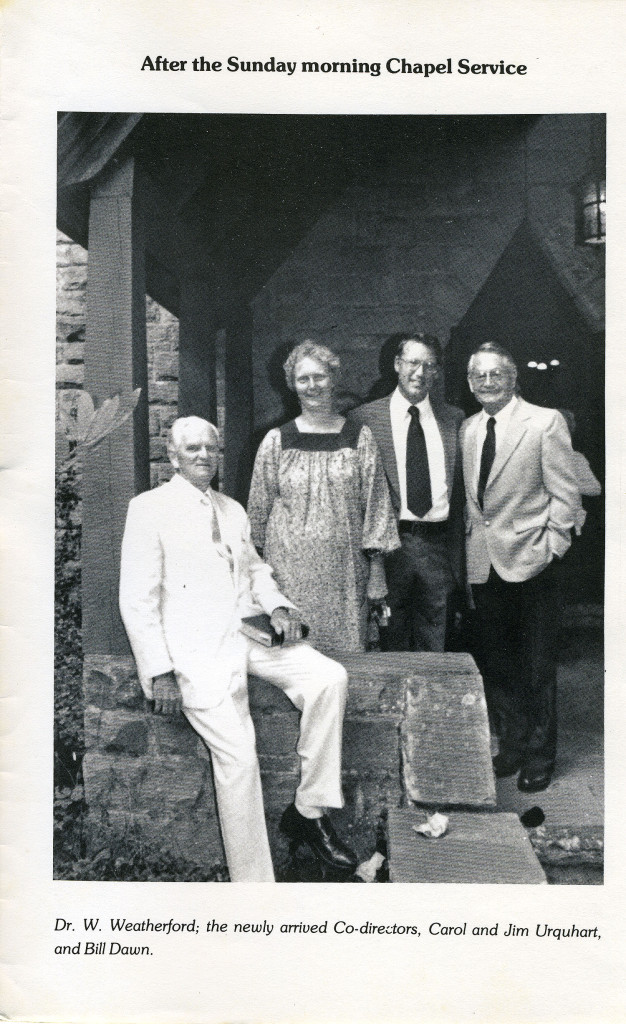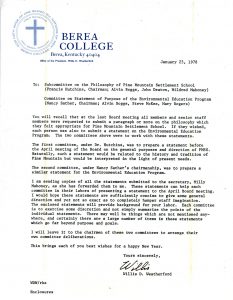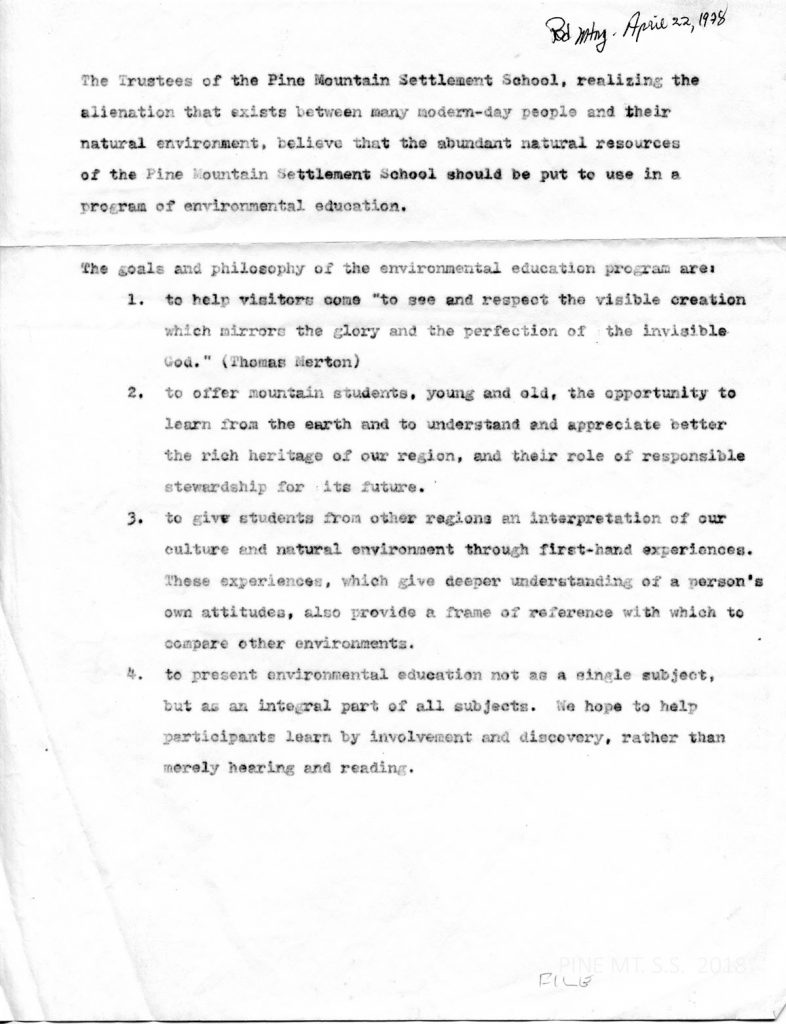Pine Mountain Settlement School
Series 05: GOVERNANCE – Board of Trustees
Philosophy of Pine Mountain Settlement School
1977-78

1983 PMSS Homecoming, p. 14. “After the Sunday morning Chapel Service. Dr. W. Weatherford, the newly arrived co-directors, Carol and Jim Urquhart, and Bill Dawn.” [1983_homecoming_0034]
GOVERNANCE 1977-78 Philosophy of Pine Mountain Settlement School
TAGS: Philosophy of Pine Mountain Settlement School, Willis Weatherford, PMSS Board of Trustees, statement of purpose of the Environmental Education Program, Dr. Francis Hutchins, Nancy Sather, subcommittees, Committee on Philosophy of PMSS, Alice Cobb, Mary Rogers, Marian Kingman, community

Willis Weatherford, Board Chair, to the Philosophy Committees, 1978. [1977-78_BOT-EE_philosophy_001]
In 1977 Willis D. Weatherford Jr., then-President of the Board of Trustees at Pine Mountain, asked each board member to write a brief statement regarding their idea of the philosophy of the Pine Mountain Settlement School. The information would be gathered in order to develop strategic planning goals and objectives for the Board of Trustees of the School.
A second letter from Weatherford, dated January 23, 1978, enclosed copies of the statements that had been received from the board members. He wrote that the statements “can help each committee in their labors of presenting a statement to the April Board meeting.” The following is a transcription of that letter. Images in the Gallery below depict Weatherford’s 1978 letter and the final statement of PMSS philosophy by the Committees.
January 23, 1978
To:
Subcommittee on the Philosophy of Pine Mountain Settlement School
(Francis Hutchins, Chairman; Alvin Boggs, John Deaton, Mildred Mahoney)
Committee on Statement of Purpose of the Environmental Education Program
(Nancy Sather, Chairman; Alvin Boggs, Steve McKee, Mary Rogers)
You will recall that at the last Board meeting all members and senior staff members were requested to submit a paragraph or more on the philosophy which they felt appropriate for Pine Mountain Settlement School. If they wished, each person was also to submit a statement on the Environmental Education Program. The two committees above were to work with these statements.
The first committee, under Dr. Hutchins, was to prepare a statement before the April meeting of the Board on the general purposes and direction of PMSS. Naturally, such a Statement would be related to the history and tradition of Pine Mountain but would be interpreted In the light of present needs. The second committee, under Nancy Sather’s chairmanship, was to prepare a
similar statement for the Environmental Education Program.
I am sending copies of all the statements submitted to the secretary, Milly Mahoney, as she has forwarded them to me. These statements can help each committee in their labors of presenting a statement to the April Board meeting. I would hope these statements are sufficiently concise to give some general direction and yet not so exact as to completely hamper staff imagination. The enclosed statements will provide background for your labor. Each committee is to exercise some discretion and not simply summarize the points of the individual statements. There may well be things which are not mentioned anywhere, and certainly, there are a large number of items in these statements which go far beyond purpose and goals.
I will leave it to the chairmen of these two to arrange their own committee deliberations.
This brings each of you best wishes for a happy New Year.
Yours sincerely,
[Willis D. Weatherford]
GOVERNANCE 1977-78 Philosophy of Pine Mountain Settlement School
Responses from the following members of the Board of Trustees were received:
ALICE COBB 1978 Philosophy of PMSS
MARIAN KINGMAN 1977 Philosophy of PMSS
MARY ROGERS 1977 Philosophy of PMSS
[Note: If other responses are found in the PMSS Collections, they will be added to this list.]
TRANSCRIPTION: Philosophy of PMSS by Board Committee, March 1978
[Note: The text has been slightly edited for clarity.]
Committee on Philosophy of PINE MOUNTAIN SETTLEMENT SCHOOL Inc.
Alvin Boggs, John H. Deaton, Mildred Mahoney, F.S. Hutchins (Chairman).
As Directors of the Pine Mountain Settlement School we are the inheritors of an institution, conceived of a great vision, built by persons of high quality, serving young people and older members of an isolated and needy community. We are given the opportunity to direct its life in its sixty-fifth year and on toward the end of its first century.
On her statement, Dr. [Alice] Cobb has written, “Actually Uncle William said it all.” That is true. In clear, lucid, simple English he summed up his vision of the School. One Man’s Cravin’ is a document which should be required reading by every person connected with Pine Mountain Settlement School.
Uncle William [Creech] was greatly disturbed by the lack of moral training for the youth, the ignorance of the people, their lack of knowledge of science, lack of knowledge of agriculture and farming, lack of knowledge of citizenship, local or national.
Times do change. 1978 is very different from 1911 when Miss Pettit and Miss De Long first visited Pine Mountain. However, fundamental needs of people — men, women, children — change little. Employment, communications, community services in education, health, etc., may change rapidly as new technologies and governmental programs develop.
Under the guidance of Uncle William and Miss Pettit and her associates, Pine Mountain Settlement School brought together staff members, children, and adults of the area for:
A boarding school program and work program.
Community activities and outreach.
The experience of living Christian concern for one another, giving purpose, insight and value to life.
At the present time the programs of Pine Mountain embrace:
-
- An environmental education program for successive groups of school children from the immediate region; opportunities for environmental education for others, including college students coming from a distance so they may understand something of the mountain people, their problems, their qualities, their value for the nation as a whole, together with the particular problems of the mountain region itself.
- The special program in cooperation with the Harlan County Board of education for disturbed children.
- The contact with Berea College for co-operation in the training of teachers for rural schools.
- A proposed contact with the South East Community College in its Head Start Program.
- There are many community contacts existing and being developed which are considered essential in the Pine Mountain program. In this community service area, there is a proposal that Pine Mountain should cooperate with the Frontier Nursing Service in having a clinic on the Pine Mountain property for the people of the area.
Page 2
COMMITTEE ON PHILOSOPHY OF PINE MOUNTAIN SETTLEMENT SCHOOL, Inc.
Alvin Boggs, John H. Deaton, Mildred Mahoney, F.S. Hutchins (Chairman).
March 1978.
F.S. Hutchin’s suggestions for the Committee:
Uncle William Creech wrote eloquently of his hopes for the School and its students:
I don’t look after wealth for them. I look for the prosperity of our nation. The question of this world is naught. We are born into it naked and go out naked. The savin’ of the soul is what we should seek. I want all young’uns taught to serve the livin’ God. Of course, they won’t all do that but they can have good and evil laid before them and they can choose which they will. I have heart and cravin’ that our people may grow better. I have deeded my land to Pine Mountain Settlement School to be used for school purposes as long as the Constitution of the United States stands. Hopin’ it may make a bright and intelligent people after I’m dead and gone.
Building on the foundations laid by Uncle William and Miss Katherine Pettit and their successors, it shall be the plan of Pine Mountain Settlement School, Inc., to use its resources (increasing them, if possible) for these purposes:
-
- To concern itself with the character and quality of human life, seeking for their enhancement; ready to work independently and with others; guided by Christian love for all those with whom it may be in touch.
- To provide for the youth of the vicinity needed educational programs, supplementing those of the public schools. Such programs may include environmental studies, recreation, vocational matters, moral needs, or special needs. In such activities the cooperation of the Harlan County Board of Education, Berea College, or other institutions will be welcomed.
- To cooperate with the people of the community in meeting social, economic, recreational, religious or other needs for the improvement of the quality of community life.
- To initiate, to cooperate with others, measures for the preservation and enhancement of the traditional qualities and characteristics of the mountain people and mountain culture.
GALLERY
- Philosophy of PMSS by Board Committee, March 1978, p. 1. [1977-78_BOT-EE_philosophy_002]
- Philosophy of PMSS by Board Committee, March 1978, p. 2. [1977-78_BOT-EE_philosophy_003]
TRANSCRIPTION: Philosophy of Environmental Education by the PMSS Board of Trustees 1978
[The document is a carbon copy of typewritten text, except for a handwritten notation in the top margin: “Bd Mtng. April 22, 1978”]
The Trustees of the Pine Mountain Settlement School, realizing the alienation that exists between many modern-day people and their natural environment, believe that the abundant natural resources of the Pine Mountain Settlement School should be put to use in a program of environmental education.
The goals and philosophy of the environmental education program are:
- to help visitors come “to see and respect the visible creation which mirrors the glory and the perfection of the invisible God.” (Thomas Merton)
- to offer mountain students, young and old, the opportunity to learn from the earth and to understand and appreciate better the rich heritage of our region, and their role of responsible stewardship for its future.
- to give students from other regions an interpretation of our culture and natural environment through first-hand experiences. These experiences, which give deeper understanding of a person’s own attitudes, also provide a frame of reference with which to compare other environments.
- to present environmental education not as a single subject, but as an integral part of all subjects. We hope to help participants learn by involvement and discovery, rather than merely hearing and reading.
GALLERY

Philosophy of Environmental Education by PMSS BOT, 1978.[pmss_philosophy_1977_kingman_004]
See Also:
GLYN MORRIS 1940 General Statement of History and Philosophy of PMSS for Staff



